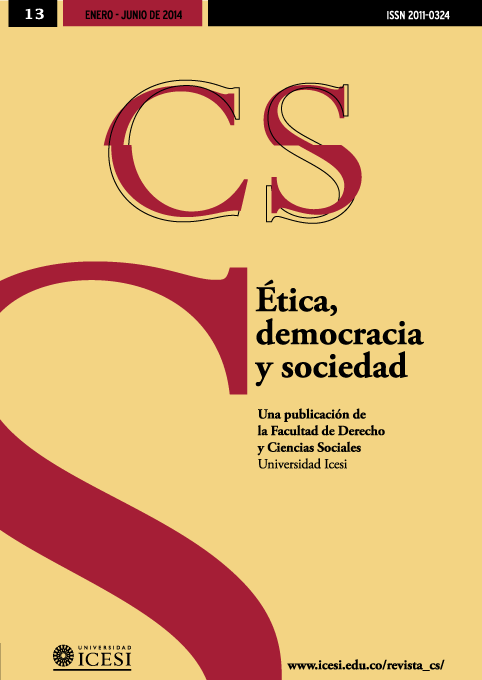Toward an Interpretation of the Ethics of Consequences in Light of a Citizenship Project
DOI:
https://doi.org/10.18046/recs.i13.1827Keywords:
ethics, consequences, Recognition, rights, the StateAbstract
This article aims to provide a basis for interpreting the ethics of consequences from the perspectives of Richard Hare, Stephen Toulmin, and G. W. F. Hegel. This exercise will serve as a call for interdisciplinary dialogue that would contribute to a systematic overview of the ethics of consequences based on reason and Recognition. Methodologically, the work is a result of qualitative interpretation and archival research. The article takes an interdisciplinary approach toward the subject, seeking to contribute conceptually to a possible interpretation of the ethics of consequence.
Downloads
References
Austin, J, L. (1955). Cómo hacer cosas con palabras. Inglaterra: Oxford.
Camps, V. (2002). Principios, consecuencias y virtudes.Daimon, Revista de filosofía. N° 27. Págs. 63–72.
Carrasco Barranco, M. (2001). Algunas objeciones al consecuencialismo ético. Universalismos, relativismos, pluralismos, Thémata. Núm. 27, Págs. 155–163.
Cejudo Córdoba, R. (2010). Deontología y consecuencialismo: un enfoque informacional. Crítica. Revista Hispanoamericana de Filosofía. Vol. 42, No. 126. Diciembre. Págs. 3–24.
Cruz–Vélez, D. (2007). Hegel y el problema del fin de la ética. En: Revista Aleph. Año 61. N° 143. Octubre–Diciembre. Págs. 15–46.
Hare, R. M. (1998). Ordenando la Ética. Ariel.
Hare, R. M. (1975).El Lenguaje de la Moral. UNAM.
Hegel, G. W. F. (2006). El Sistema de la Eticidad. Ed. Quadrata.
Hegel, G. W. F. (1985). Fenomenología del Espíritu. Ed. Fondo de Cultura Económica.
Hegel, G. W. F. (2010). Fenomenología del Espíritu. Ed. Abada.
Hegel, G. W.F. (2006). El sistema de la eticidad. Ed. Quadrata
Hegel, G. W. F. (2004). Principios de la Filosofía del Derecho. Sudamericana.
Hegel, G. W. F. (1994). Lecciones sobre la filosofía de la historia universal. T. II. Ed. Altaya.
Jaeger, W. (1980). Paideia: los ideales de la cultura griega. Ed. Fondo de Cultura Económica.
Kissel, M. A. (1969). Hegel y la Crisis de la Ética Burguesa. Ed. Suramerica.
Leyva, G. (2002). La superación de la ética en la Rechtsphilosophie de Hegel. En: ética y política. Entre tradición y modernidad. Ed. Plaza y Valdéz.
Lukács, G. (1963). El Joven Hegel y los Problemas de la Sociedad Capitalista. Ed. Grijalbo.
Pinkard, T. (2001).Hegel una biografía. Ed. Acento.
Schopenhauer, A. (1978). El amor, las mujeres y la muerte. Ed. Bedout.
Smart, J. J. C. y Williams, B. (1981). Utilitarismo. Pro y contra. Ed. Tecno.
Torralba, J.M. (2010). Consecuencialismo. González, A. L. (ed.), Diccionario de Filosofía, Eunsa, Pamplona, pp. 207–211.
Toulmin, E. S. (1964). El Puesto de la Razón en la Ética. Ed. Revista de Occidente.
Rawls, J. (1997). Un examen del lugar de la razón en la ética. Daimon. Revista de filosofía. N° 15, Págs. 11–17.
Downloads
Published
Issue
Section
License
Copyright (c) 2014 Luis Alberto Carmona Sanchéz

This work is licensed under a Creative Commons Attribution-NonCommercial 4.0 International License.
© Reserved Copyright
Material in this publication may be reproduced without authorization, provided the title, author and institutional source is acknowledged.
The content published in Revista CS is distributed under the Creative Commons BY-NC 4.0 Attribution/Recognition-NonCommercial 4.0 International license.
You are free to:
Share — copy and redistribute the material in any medium or format.
Adapt — remix, transform, and build upon the material.
Under the following terms:
Attribution — You must give appropriate credit , provide a link to the license, and indicate if changes were made . You may do so in any reasonable manner, but not in any way that suggests the licensor endorses you or your use.
NonCommercial — You may not use the material for commercial purposes.












